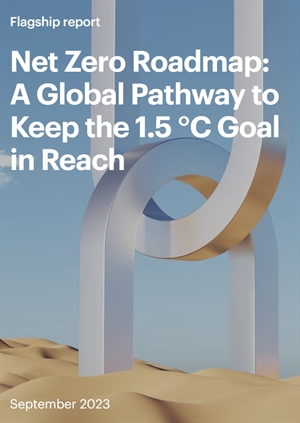IEA report says path to 1.5C has narrowed but clean energy growth is keeping it open
Wed 27 September 2023
View all news

A new report from the International Energy Agency says that greater ambition and policy implementation, plus stronger international cooperation, will be critical to reaching climate goals. The Agency's latest report also downgrades the anticipated contribution of 'technofixes' such as carbon capture and storage as well as that of hydrogen in terms of their to contribute to climate goals.
Shortly after scientists confirmed that July 2023 was the world's hottest ever year on record, the IEA's new Roadmap sets out a global pathway to keep the 1.5 °C goal in reach, updating the original 2021 report that has served as an essential benchmark for policy makers, industry, the financial sector and civil society. The 2023 Update incorporates the significant changes to the energy landscape in the past two years, including the post-pandemic economic rebound and the extraordinary growth in some clean energy technologies – but also increased investment in fossil fuels and stubbornly high emissions.
The IEA says that since 2021, record growth in solar power capacity and electric car sales are in line with a pathway towards net zero emissions globally by mid-century, as are industry plans for the roll-out of new manufacturing capacity for them. This is significant, since those two technologies alone deliver a third of the emissions reductions between today and 2030 in the pathway. Clean energy innovation has also been delivering more options and lowering technology costs.
However, the IEA says that bolder action is necessary this decade.
IEA Executive Director Fatih Birol said: “Keeping alive the goal of limiting global warming to 1.5 °C requires the world to come together quickly. The good news is we know what we need to do – and how to do it. Our 2023 Net Zero Roadmap, based on the latest data and analysis, shows a path forward.
“But we also have a very clear message: Strong international cooperation is crucial to success. Governments need to separate climate from geopolitics, given the scale of the challenge at hand.”
The IEA says that the international community should focus on the “most cost-effective” solutions, like ramping up renewables, energy efficiency and electrification and now expects carbon capture and storage as well as hydrogen to play a less important role as their development is failing to live up to expectations.
Dr Birol said: “Removing carbon from the atmosphere is very costly. We must do everything possible to stop putting it there in the first place.”
The IEA has also cast doubt over the role of hydrogen in the transition, commenting that while demand for hydrogen has been rising, the overwhelming majority of it has been met with polluting production processes, mostly involving gas.
The IEA says it sees a diminished potential for hydrogen to decarbonise long-distance transport and iron and steel production, and only then if it comes from low emission sources such as renewables.
Related Links
< Back to news list